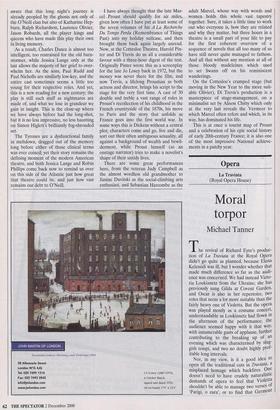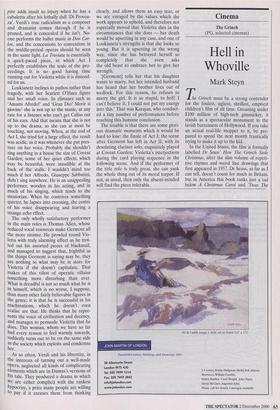Opera
La Traviata (Royal Opera House)
Moral torpor
Michael Tanner
The revival of Richard Eyre's produc- tion of La Traviata at the Royal Opera didn't go quite as planned, because Elena Kelessidi was ill, but I wonder whether that made much difference so far as the audi- ence was concerned. We had instead Victo- ria Loukianetz from the Ukraine; she has previously sung Gilda at Covent Garden, and Oscar is also in her repertoire, two roles that seem a lot more suitable than the fairly heavy one of Violetta. But the opera was played mostly as a costume concert, understandable as Loukianetz had flown m the afternoon of the performance; the audience seemed happy with it that way, with innumerable gusts of applause, further contributing to the breaking up of an evening which was characterised by slug- gish tempi, and two no doubt highly prof- itable long intervals. Nor, in my view, is it a good idea to open all the traditional cuts in Traviata, a misplaced homage which backfires. On.e doesn't need to have crudely naturalistic demands of opera to feel that Violetta shouldn't be able to manage two verses of o cara', or to find that Germont pere adds insult to injury when he has a cabaletta after his lethally dull 'Di Proven- za'. Verdi's true radicalism as a composer and dramatist comes through if he is pruned, and is concealed if he isn't. No- one performs the ballet music in Don Car- los, and the concessions to convention in the middle-period operas should be seen in the same light. La Traviata is essentially a quick-paced piece, in which Act I perfectly establishes the scale of the pro- ceedings. It is no good having time running out for Violetta while it is distend- ed for us.
Loukianetz inclines to pathos rather than tragedy, with her Scarlett O'Hara figure and her small voice. In climaxes such as 'Amami Afredo!' and 'Gran Dio! Morir Si giovine' she is not up to the music, at any rate for a listener who can't get Callas out of his ears. And that means that she is not up to the drama, so she can at most be touching, not moving. When, at the end of Act I, she tried for a large effect, the result was acidic, as it was whenever she put pres- sure on her voice. Probably she shouldn't sing anything in a house the size of Covent Garden; some of her quiet effects, which may be beautiful, were inaudible at the back of the stalls. I wouldn't mind too much if her Alfredo, Giuseppe Sabbatini, didn't sing anywhere. He is an unappealing performer, wooden in his acting, and in much of his singing, which tends to the stentorian. When he contrives something quieter, he lapses into crooning, the centre of his voice disappearing and leaving a strange echo effect.
The only wholly satisfactory performer in the main roles is Thomas Allen, whose reduced vocal resources make Germont all the more sinister. He prowled round Vio- letta with truly alarming effect as he trot- ted out his assorted pieces of blackmail, and managed to suggest that, frightful as the things Germont is saying may be, they are nothing to what may be in store for Violetta if she doesn't capitulate. That makes of this vilest of operatic villains something more disturbing than ever. What is dreadful is not so much what he is in himself, which is no worse, I suppose, than many other fairly believable figures in the genre; it is that he is successful in his machinations, which he doesn't even realise are that. He thinks that he repre- sents the voice of civilisation and decency, and manages to persuade Violetta that he does. This woman, whom we have so far had every reason to feel warmly towards, suddenly turns out to be on the same side as the society which exploits and condemns her.
As so often, Verdi and his librettist, in the interests of turning out a well-made Opera, neglected all kinds of complicating elements which are in Dumas's versions of his tale. They produced a drama in which We are either complicit with the rankest hypocrisy, a price many people are willing to pay if it excuses them from thinking clearly, and allows them an easy tear; or we are enraged by the values which the work appears to uphold, and therefore not especially moved that Violetta dies in the circumstances that she does — her death would be upsetting in any case, and one of Loukianetz's strengths is that she looks so young. But it is upsetting in the wrong way, since she has betrayed herself so completely that she even asks the old beast to embrace her to give her strength.
'Germont] tells her that his daughter wants to marry, but her intended husband has heard that her brother lives out of wedlock. For this reason, he refuses to marry the girl. It is so stupid, to hell! I can't believe it. I could not put my energy into this.' That was Karajan, who conduct- ed a tiny number of performances before reaching this humane conclusion.
The trouble is that there are some glori- ous dramatic moments which it would be hard to lose: the finale of Act I; the scene after Germont has left in Act II, with its desolating clarinet solo, exquisitely played at Covent Garden; Violetta's interjections during the card playing sequence in the following scene. And if the performer of the title role is truly great, she can yank the whole thing out of its moral torpor. If not, as usual, then only the absent-minded will find the piece tolerable.



















































































 Previous page
Previous page